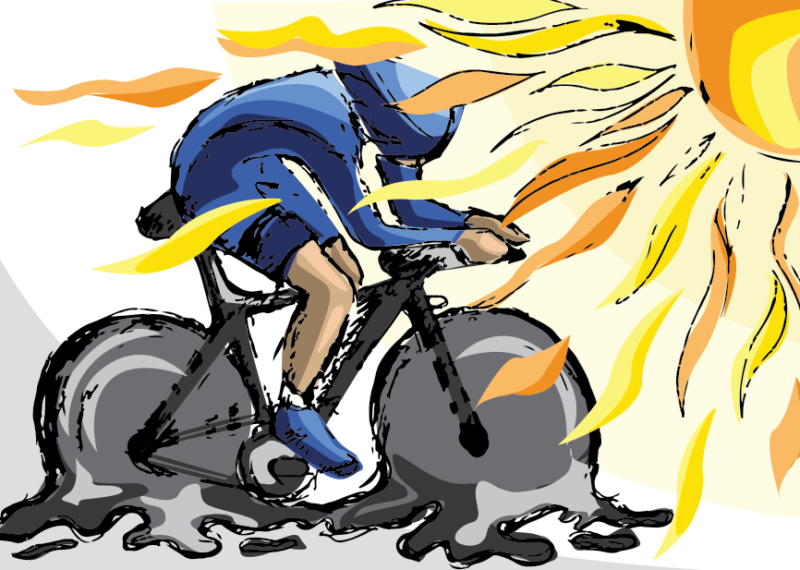
Billions Of People Just Felt The Deadly
Intensity Of Climate-Fueled Heat Waves
Sarah Kaplan and Scott Dance / The Washington Post
(June 22, 2024) — “Scorching heat across five continents set 1,400 records this week and showed how human-caused global warming has made catastrophic temperatures commonplace.”
“Dozens of bodies were discovered in Delhi during a two-day stretch this week when even sundown brought no relief from sweltering heat and humidity. Tourists died or went missing as the mercury surged in Greece. Hundreds of pilgrims perished before they could reach Islam’s holiest site, struck down by temperatures as high as 125 degrees.
The scorching heat across five continents in recent days, scientists say, provided yet more proof that human-caused global warming has so raised the baseline of normal temperatures that once-unthinkable catastrophes have become commonplace.
The suffering came despite predictions that a year-long surge of global heat might soon begin to wane. Instead, in the past seven days alone, billions felt heat with climate change-fueled intensity that broke more than 1,000 temperature records around the globe. Hundreds fell in the United States, where tens of millions of people across the Midwest and Eastern Seaboard have been sweltering amid one of the worst early-season heat waves in memory.”

Athletes Warn ‘Hottest Games on Record’
Could Threaten Lives at Paris Olympics
(June 17, 2024) — The Paris Olympics could be the hottest Games on record, with leading athletes warning that the intense heat forecast for competition could lead to athletes collapsing or – in a worst-case scenario – dying in competition.
A new report, Rings of Fire: Heat Risks at the 2024 Paris Olympics, argues the 2021 games held in Tokyo “offered a window into an alarming, escalating norm for Summer Olympics”.
With temperatures above 34C and humidity approaching 70%, the Games were described as “the hottest in history”.
“Competitors vomited and fainted at finish lines, wheelchairs were deployed to carry athletes away from sun-scorched arenas and the fear of dying on court was even raised mid-match by the Tokyo Games’ No 2 seeded tennis player Daniil Medvedev,” the report says.
Inaction on climate change and the continued rate of fossil fuel use has caused the world to warm further in the three years since, and cases of extreme heat jeopardising and undermining sporting events has only increased.
“We now know the Paris Games have the potential to surpass [Tokyo’s heat record],” Emma Pocock, the chief executive of FrontRunners, one of the organisations behind the report said, “with climate change driven by the burning of fossil fuels contributing to record heat streaks during the past months.”
Pocock described the Rings of Fire report as a “stake in the ground”, and an urgent call to sport governing bodies to take action on global heating.
“If the planet continues to warm, sports as we know and love are at risk.”
Since 1924, when Paris last hosted the Olympics, annual temperatures in the French capital have warmed by 1.8C while, on average, there are 23 more “hot” days (25C+) and nine more “scorching” (30C+) days a year.

Paris has experienced 50 heatwaves since 1947, and they have been increasing in frequency and intensity as a result of the climate crisis. In 2003 in July and August – the same time as the upcoming Olympics will be held – a record heatwave resulted in more than 14,000 excess deaths in France.
The French forecaster Météo France has already predicted warmer than normal conditions for May to July across the country. There is a 70% chance it will be hotter than usual, the forecaster said.
In a “consensus statement”, the International Olympic Committee proposed a suite of mitigation measures to safeguard the health of athletes. But it recognised extreme heat as a growing problem for sport around the world.
“Unfortunately, the level of environmental heat stress experienced by elite athletes will continue to rise in the coming years due to a combination of the increased prevalence, intensity and duration of bouts of … heat waves that are occurring due to climate change, and sport globalisation leading to more competitions being organised in extremely hot climates.”
Hot and/or humid conditions make it harder for athletes to regulate their core body temperature, impairing physical performance, particularly in endurance events.
For athletes competing in extreme heat, the health risks run from sunburn and heat cramps, through to heat exhaustion or even collapse from heatstroke, which is life-threatening.
The Australian racewalker Rhydian Cowley will compete at his third Olympics in Paris and said he was concerned for the health, and the lives, of athletes.
“We already know that extreme heat is a silent killer among the general population, and that even with prior preparation and intervention, it can still be risky for athletes to compete in.
“So, absolutely, I’m concerned that extreme heat in competition could threaten the lives of athletes.”
The Australian javelin thrower Kelsey-Lee Barber, an Olympic bronze medallist in Tokyo and two-time world champion, said she was concerned at how quickly competing in extreme temperatures had become a reality.
“While we have adapted to the likelihood of competing in extreme heat, the bigger picture of why we are experiencing it isn’t being addressed: it’s just been accepted and planned for. I think there should be more awareness around the bigger picture when it comes to rising temperatures.”

Sebastian Coe, the president of World Athletics – and a two-time Olympic gold medallist – said the consequences of global heating on athletes “can be varied and wide-ranging”, from smaller performance-impacting issues like sleep disruption and last minute changes to event timings, to severe health impacts such as heat related stress and injury.
“While global temperatures continue to rise, climate change should increasingly be viewed as an existential threat to sport. We are in a race against time. And this is one race that we simply cannot afford to lose.”
See Also:
- “Well Beyond the U.S., Heat and Climate Extremes Are Hitting Billions” (New York Times)
- “How US Industries Deal With Extreme Heat” (Reuters)
- “How Does Heat Kill? It Confuses Your Brain. It Shuts Down Your Organs. It Overworks Your Heart.” (AP)
- “Intense Heat In Gaza Could Worsen Health Crisis For Palestinians, WHO Warns” (Reuters)